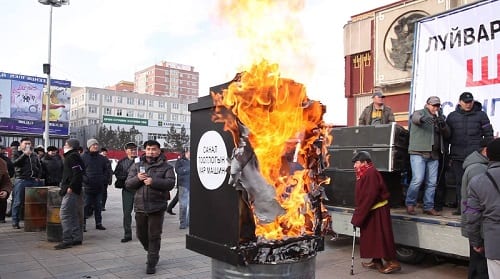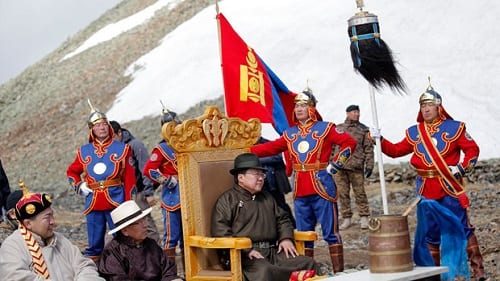The Black Box of Presidential Politics
By ucsadul, on 17 June 2017
This blog was co-authored by Bumochir Dulam and Rebecca Empson.
As Mongolians are getting closer to vote for their new President, campaigning among the three candidates, M. Enkhbold from the Peoples Party, Kh. Battulga from the Democratic Party, and S. Ganbaatar from the Revolutionary Party, is in full swing.
Like last year’s parliamentary elections, rumours circulate as to the motivations, characters, and aims of the three candidates, and speculations abound about whom is ‘behind’ (or supporting) whom (see our blog post). ‘People [are] constantly searching for meaning – connections and explanations – in actions they [find] difficult to read and understand. In fact this searching for meaning and speculation is [very much] what politics is in Mongolia. It is the speculation of connections and motivations beyond the visible and tangible. To understand politics – or to think politics – is to understand the underside of things, beyond the way things appear to the ordinary eye, to uncover the workings of a kind of magic or religion.’ (Rebecca Empson, 2016).
In this post we discuss rumours circulating around the use of Electronic Voting Machines (Mng. Songuuliin Khar Mashin, coll. Khar Khairtsag, ‘Black Box’) in Mongolian elections, and the President’s involvement in securing his successor. In doing so we extend the use of the phrase ‘Black Box’ to explore aspects of Mongolian politics that are unclear or opaque to the general public.[1]
***
Against the background of the 2008 July riots, which were sparked by allegations of fraud surrounding the legislative election and which lead to a state of emergency which lasted for four days and included five civilian deaths (cf. Kaplonski, Delaplace, and Sneath 2008), and in order to go some way in countering speculations of tampering with votes, in June 2012 Electronic Voting Machines were introduced to count votes in the parliamentary elections.
The infamous ‘black boxes’ (Mng. Khar Khairtsag) (called ‘New Image Cast’) were brought from America, from a company called ‘Dominion Voting’, by a Mongolian company called Interactive.

Over 2,500 ‘black boxes’ were used throughout the country in the 2012 Parliamentary elections. Source: www.baatar.mn
While some doubted their impartiality, many were impressed and relieved at their implementation, believing that the black boxes were secure and would eliminate human error and bias in counting votes. Results, it was reported, would be sent immediately to the General Election Committee, avoiding manual tabulation by local election officials.
However, on June 30th, 2012, the Mongolian People’s Party and 8 smaller parties questioned the use of the machines and called for a recount of the votes by hand. In contrast, the Democratic Party, headed by Ts. Elbegdorj, backed the automated system and became the majority in the new coalition government.
Despite their alleged ‘impartiality’, speculation has continued to circulate about the possibility that the khar mashin’s are rigged or can be ‘hacked’ (songoliin haker) (cf. Oldoh 2017). The General Election Committee (Songuuliin yeronhii horoo) maintains and runs the black boxes and its IT officers are in charge of installing and updating programs on the machines (Bat-Ireedui 2015). According to some, this means that powerful politicians could very well influence and manipulate the General Election Committee, making sure the machines were used for their own means.
On the 10th December 2015 a protest was arranged in Mongolia against the use of electronic voting machines in elections. On the same day, Delkhiin Mongolchuud Radio posted a Mongolian dubbed version of the American film ‘Hacking Democracy’, directed by Simon Ardzzone. This film showed how elections could be tampered with using various kinds of technology, including the Electronic Voting Machines, and emphasised how they could ‘steal’ (luivar) votes. On the same day as the film circulated a protest was arranged ‘for a fair election without the use of the corrupt black machine’ and an effigy of the ‘khar mashin’ was burnt in Ulaanbaatar.

Burning of a Black Box Effigy. Text on box reads: ‘Black machine for vote counting’. Source: UBS.MN
In 2017, further protests were arranged by the ‘Free Association of Elders’ (Ahmadyn choloot holboo) (Olziibayar 2017), ‘United Association of non-party citizens’ (Nam bus irgediin negdsen holboo) (Urantsetseg 2017), and the ‘Fair centre’ for the protection of victims’ rights and interests (Hohirogchidyn erh ashgiig hamgaalah ‘shudraga tov’) (Uchral 2017) calling for an end of the use of Electronic Voting Machines to count election votes.
Regardless of such protests, the electronic voting boxes will be used in 50 % of votes in the up-coming presidential election, despite rumours circulating that Ts. Elbegdorj controls the very black boxes that he used to bring himself and his own party into power. Indeed, people speculate that he can determine their outcome.
This idea is so prevalent that Kh. Battulga, the candidate of the Democratic Party, is now suspected to be involved in an attempt to buy the very same machines from America for use in the up-coming elections to count his own votes. M. Udaanjargal, his Political Advisor (zovloh), is now under police investigation for attempting to purchase the boxes from the American company ‘Dominion Voting Systems’ (Od 2017). If this rumour is correct, then it is held by many to confirm speculation that the electronic voting boxes can be used to hack votes.
***
Rumours over Elbegdorj’s ‘ownership’ and control over the black boxes extend to speculation about his control over the whole elections. The black boxes and uncertainty over the ‘true’ power behind them becomes a metaphor for the different candidates and questions over who actually ‘controls’ them. In this murky world of political wrangling people speculate that Elbegdorj is in fact behind the appointment of all three candidates, having deliberately supported them at various times, and put them in place to rig the election in order to determine his own succession.
A major reason for this, it is speculated, is to secure himself against future corruption charges (particularly the Erdenet 49% share, etc) once he has seeded his position. Attempting to align himself with all three candidates, he hopes to avoid any opposition that will come to question his reign as President.
Such speculation circulates along the following lines: once a major donor and founding supporter of HUN Nam (Hodolmoriin Undesnii Nam – the National Labour Party), he is behind the appointment of the candidate S. Ganbaatar. He is also a supporter Kh. Battulga, who supported Elbegdorj’s presidential campaign eight years ago, and who at this election seems to be garnering the most public support. However, these two might be considered mere puppets for his steadfast support of M. Enkhbold for President, whom many in fact consider to be the only ‘real’ political candidate.
Despite his political credentials, many worry that M. Enkhbold’s appointment could provoke riots among the public who largely support Kh. Battulga (as shown by the wide range of people who supported him when his offices were raided last year), and at worst burn down the People’s Party building, as in the 2008 riots.
Rumours also circulate that Elbegdorj is protecting himself against future corruption charges by confirming his connections within the MANAN group or faction (frakts). MANAN is a term derived from two acronyms: ‘MAN’, the acronym for the Mongolian People’s Party, Mongol Ardyn Nam, and ‘AN’, the acronym for the Democratic Party, Ardchilsan Nam. Pairing ‘MAN’ with ‘AN’ makes the Mongolian term for ‘fog’ (Manan), hinting at the blurred and opaque character of Mongolian political alliances and factions.
It is speculated that the key people heading the MANAN faction is M. Enkhbold, chair of the People’s Party, current speaker and presidential candidate, and Ts. Elbegdorj, the current President of Mongolia. These high-ranking politicians within MANAN are seen as the most powerful politicians in the country, wielding the most power. Elbegdorj’s close association with MANAN, his control over the black boxes, over the supreme court, over the constitution, over the media, and, indeed, over the outcome of the current election leads some to refer to him as the ‘Khaan of Mongolia’.

Ts. Elbegdorj honouring the Black State Standards at Burkhan Khaldun. Source: http://old.eagle.mn/content/read/32090.html
No wonder, then, that the appointment of some candidates over others, and the control of certain voting systems is thought to be highly divisive.
Attending to the circulation of such speculation and rumour in this blog piece is not meant to ‘expose’ some sacred truth behind the current ‘fog’ of democracy. Rather it alerts us to the form that politics is currently taking in Mongolia. Through this we see that trying to uncover motivations and speculating about new ones is a major feature of political conversations among the general public. Once this fog has cleared, it is hoped by many that the ‘true’ nature of what politics should be about will be allowed to flourish. Perhaps then the black boxes will come to symbolise something entirely different.
References:
2008 ‘The end of post-socialism? An account of the 1st of July riots in Ulaanbaatar, Mongolia,’ Kaplonski, Chris, Gregory Delaplace and David Sneath; Inner Asia 10(2): 353-365.
Bat-Ireedui, J. 2015. Who and how maintains the black machines. MGLRADIO102.1. http://mglradio.com/home/?mid=fastnews&page=8&document_srl=21737
Od, E. 2017. “Jenko” songuuliin “har mashin” hudaldan avchee (“Jenko” bought election “black machines” ). http://www.shuurhai.mn/?p=150846
Oldoh, Ch. 2017. A. Erdenebayar: Manaid ashiglaj baigaa snala tooloh mashiny zoriulalt n oor (A. Erdenebayar: Vote counting machines we use in Mongolia is designed for different purpose). http://sonin.mn/news/politics-economy/79123
Olziibayar, T. 2017. G. Baasan: Yeronhiilogchiin songuuliin dung garaar toolohyg shaardaj baina (G. Baasan: Demanding to count presidential election votes by hand). http://www.ikon.mn/n/10wt
Urantsetseg, U. 2017. Iregdiin sanalyg garaar toolohyg urialj medegdel hiiv (Made a statement appealing to count peoples’ votes by hand). http://medee.mn/mobile.php?eid=93422
Uchral, B. 2017. Bid garaar toolj nudeer harj yeronhiilogchoo songomoor baina (We want to elect our presdeint by looking with our eyes and counting with our hands). http://www.ikon.mn/n/10yt
[1] In English and Mongolian the term ‘black box’ or ‘khar khairtsag’ is a metaphor for a system where you can see what is entering and exiting but you do not know what is going on inside the system.
 Close
Close



